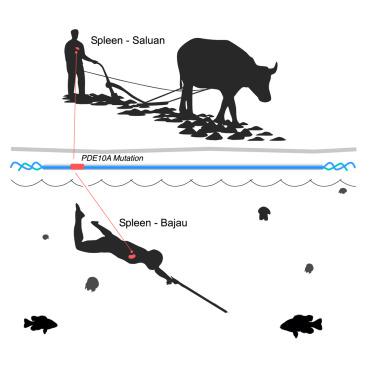Our official English website, www.x-mol.net, welcomes your feedback! (Note: you will need to create a separate account there.)
Physiological and Genetic Adaptations to Diving in Sea Nomads.
Cell ( IF 64.5 ) Pub Date : 2018-Apr-19 , DOI: 10.1016/j.cell.2018.03.054 Melissa A. Ilardo , Ida Moltke , Thorfinn S. Korneliussen , Jade Cheng , Aaron J. Stern , Fernando Racimo , Peter de Barros Damgaard , Martin Sikora , Andaine Seguin-Orlando , Simon Rasmussen , Inge C.L. van den Munckhof , Rob ter Horst , Leo A.B. Joosten , Mihai G. Netea , Suhartini Salingkat , Rasmus Nielsen , Eske Willerslev
Cell ( IF 64.5 ) Pub Date : 2018-Apr-19 , DOI: 10.1016/j.cell.2018.03.054 Melissa A. Ilardo , Ida Moltke , Thorfinn S. Korneliussen , Jade Cheng , Aaron J. Stern , Fernando Racimo , Peter de Barros Damgaard , Martin Sikora , Andaine Seguin-Orlando , Simon Rasmussen , Inge C.L. van den Munckhof , Rob ter Horst , Leo A.B. Joosten , Mihai G. Netea , Suhartini Salingkat , Rasmus Nielsen , Eske Willerslev

|
Understanding the physiology and genetics of human hypoxia tolerance has important medical implications, but this phenomenon has thus far only been investigated in high-altitude human populations. Another system, yet to be explored, is humans who engage in breath-hold diving. The indigenous Bajau people ("Sea Nomads") of Southeast Asia live a subsistence lifestyle based on breath-hold diving and are renowned for their extraordinary breath-holding abilities. However, it is unknown whether this has a genetic basis. Using a comparative genomic study, we show that natural selection on genetic variants in the PDE10A gene have increased spleen size in the Bajau, providing them with a larger reservoir of oxygenated red blood cells. We also find evidence of strong selection specific to the Bajau on BDKRB2, a gene affecting the human diving reflex. Thus, the Bajau, and possibly other diving populations, provide a new opportunity to study human adaptation to hypoxia tolerance. VIDEO ABSTRACT.
中文翻译:

海上游牧民潜水的生理和遗传适应。
了解人体对缺氧耐受性的生理学和遗传学具有重要的医学意义,但是迄今为止,这种现象仅在高海拔人群中进行了研究。尚待探索的另一种系统是从事屏气潜水的人。东南亚的土著Bajau人(“海洋游牧民族”)以屏气潜水为基础,过着自给自足的生活方式,并以其非凡的屏气能力而闻名。但是,尚不清楚这是否具有遗传基础。使用比较基因组研究,我们显示PDE10A基因遗传变异的自然选择增加了Bajau的脾脏大小,为它们提供了更大的氧化红细胞库。我们还在BDKRB2上找到了针对Bajau的强烈选择的证据,影响人类潜水反射的基因。因此,Bajau和其他可能的潜水人群为研究人类对低氧耐受性的适应性提供了新的机会。视频摘要。
更新日期:2018-04-26
中文翻译:

海上游牧民潜水的生理和遗传适应。
了解人体对缺氧耐受性的生理学和遗传学具有重要的医学意义,但是迄今为止,这种现象仅在高海拔人群中进行了研究。尚待探索的另一种系统是从事屏气潜水的人。东南亚的土著Bajau人(“海洋游牧民族”)以屏气潜水为基础,过着自给自足的生活方式,并以其非凡的屏气能力而闻名。但是,尚不清楚这是否具有遗传基础。使用比较基因组研究,我们显示PDE10A基因遗传变异的自然选择增加了Bajau的脾脏大小,为它们提供了更大的氧化红细胞库。我们还在BDKRB2上找到了针对Bajau的强烈选择的证据,影响人类潜水反射的基因。因此,Bajau和其他可能的潜水人群为研究人类对低氧耐受性的适应性提供了新的机会。视频摘要。



























 京公网安备 11010802027423号
京公网安备 11010802027423号